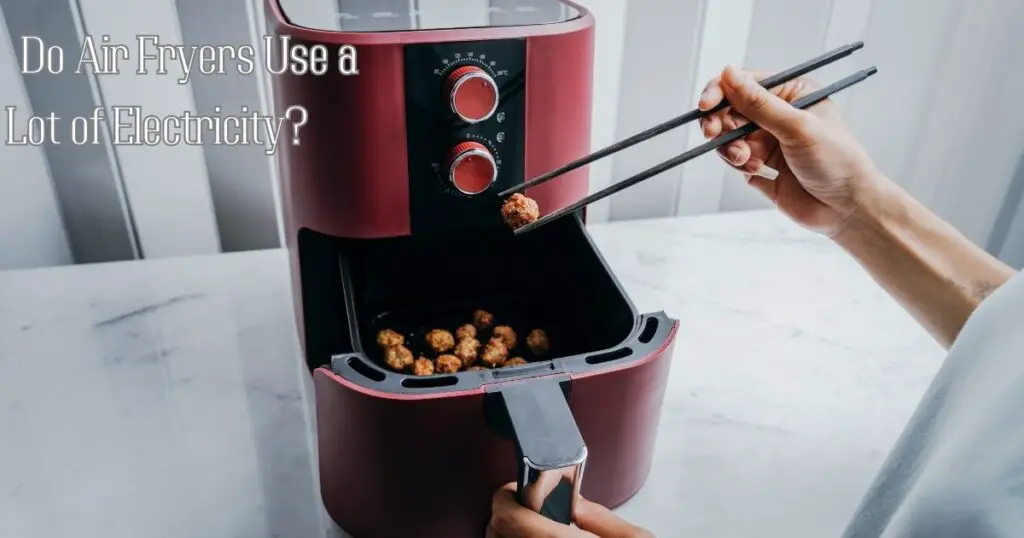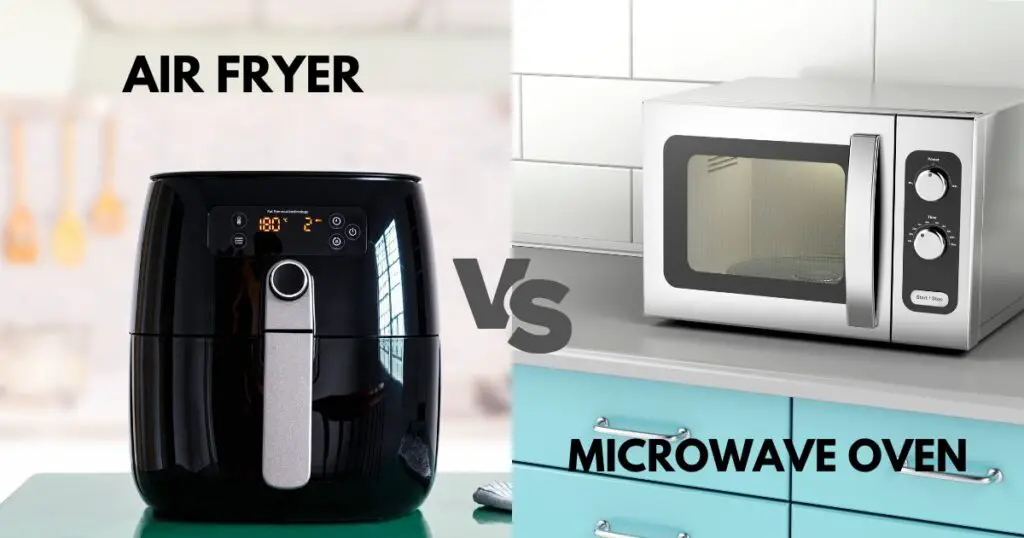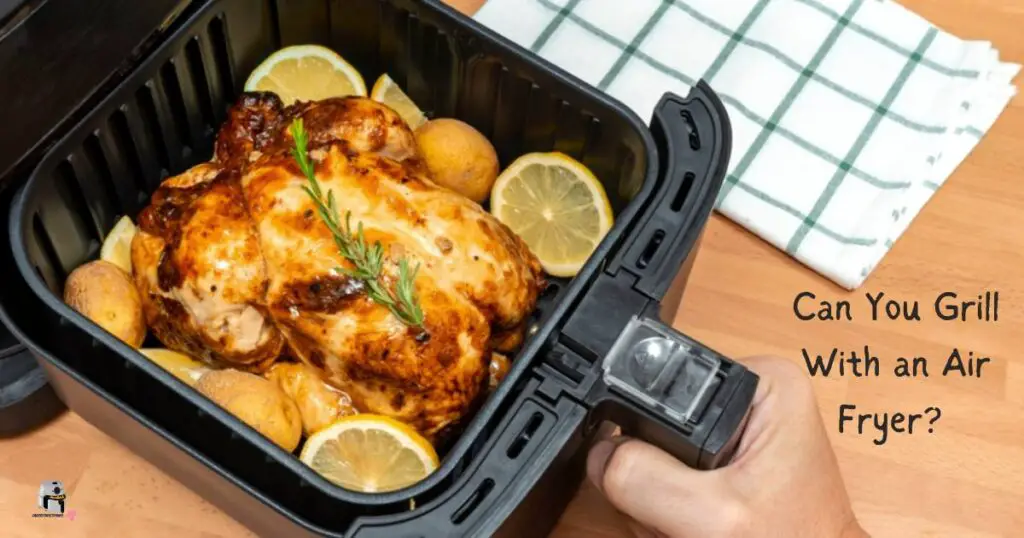Table Of Contents
No, air fryers don’t use a lot of electricity. Air fryers are well-known for their energy efficiency, consuming about 1.5 kWh each operation hour. This is significantly less than what a conventional oven consumes during the same timeframe, which can be as high as 3,000 to 6,000 watts, depending on the model.
Additionally, air fryers do not run continuously, further reducing their overall energy consumption. Consequently, incorporating an air fryer into your kitchen appliances is unlikely to impact your electricity bill substantially.
Their wattage typically falls within the 1500W to 2400W range, making them an energy-conscious choice for cooking tasks.

Factors That Affect Air Fryers Electricity Consumption
Several factors affect the electricity consumption of air fryers:
Wattage
Wattage ratings for air fryers commonly range from 800 to 1800 watts. Models with higher wattage can cook food faster due to increased heating power but may also consume more electricity, especially when running at higher power settings.
Cooking Time
The duration of time you use the air fryer directly affects how much electricity is used. Longer cooking times, such as roasting or baking, will naturally use more energy. On the other hand, shorter cooking times, like reheating leftovers or making quick snacks, are generally more energy-efficient.
Temperature Setting
The cooking temperature you choose also has an impact on energy usage. Cooking at higher temperatures requires more energy to maintain, so choosing lower temperatures when appropriate can improve energy efficiency without compromising food quality.
Cooking Capacity
Filling the air fryer to its recommended capacity is generally more energy-efficient than cooking multiple small batches. Maximizing the use of the appliance during each cooking cycle reduces overall electricity use.
Preheating
While preheating the air fryer is essential for certain recipes, it does consume additional energy. To minimize energy use, consider preheating for shorter durations, striking a balance between recipe requirements and efficiency.
Frequency of Use
The frequency of use of the air fryer affects your overall electricity usage. Frequent use of various meals and snacks may lead to higher energy consumption. Deciding when and how often to use it can affect energy costs.
Accessories and Cookware
The choice of accessories and cookware can impact energy efficiency. Using items that properly fit the air fryer’s basket minimizes unnecessary energy loss. Additionally, using accessories designed for air fryers can enhance cooking efficiency.
Insulation
Well-insulated air fryers excel at heat retention, minimizing the necessity for extended cooking durations or elevated temperatures. These insulated models are known for their more effective energy utilization, contributing to efficient and quicker cooking processes.
Air Circulation
Effective air circulation systems ensure even heat distribution within the cooking chamber. This has the potential to significantly decrease cooking durations, ultimately leading to reduced energy consumption and more efficient cooking processes.
Food Preparation
Properly preparing food before placing it in the air fryer can help reduce cooking time and energy consumption. For example, patting ingredients dry and lightly coating them with oil can lead to quicker and more energy-efficient cooking.
By considering and managing these factors, users can optimize the energy efficiency of their air fryers, achieving a balance between cooking needs and energy conservation.
Read More:
Air Fryer Power Consumption in Comparison to Other Appliances
To provide a comparison of air fryer power consumption with other common kitchen appliances, here’s a table showing the wattage range for each appliance:
| Appliance | Power Consumption (Watts per hour) |
| Air Fryer | 1500 |
| Refrigerator | 300 |
| Conventional Oven | 2300 |
| Dryer | 2700 |
| Cooktop | 1500 |
| Convection Oven | 2400 |
| Oven | 2300 |
| Pressure Cooker | 1000 |
| Deep Fryer | 18000 |
In terms of power consumption, an air fryer’s 1500-watt hourly usage is akin to that of a cooktop. Its energy efficiency, however, particularly differs from that of equipment like ovens, deep fryers, and pressure cookers.
Tips To Reduce Electricity Use When Using An Air Fryer
Below are some suggestions to help you reduce electricity when using an air fryer:
Optimal Sizing
Start by choosing an air fryer that will meet the needs of your household. Choosing an appropriately sized appliance prevents unnecessary energy consumption. If you consistently prepare smaller portions, opt for a compact model.
Strategic Preheating
Preheating is vital for some recipes but can be done efficiently. Reduce preheating times to a minimum while still ensuring your appliance reaches the required temperature for the dish. This saves energy without compromising cooking quality.
Batch Cooking
When possible, cook in larger batches rather than numerous small ones. This approach maximizes your air fryer’s capacity and reduces cooking time. Preparing meals in batches is not only energy-efficient but also time-saving.
Temperature Tweaks
Experiment with lower cooking temperatures when suitable for your recipes. Several dishes can be cooked at slightly lower temperatures while retaining flavor and texture. Lower temperatures consume less energy over time.
Proper Spacing
When the air fryer basket is overcrowded, efficient air circulation is hampered, resulting in uneven frying and lengthier cooking periods. Maintain adequate spacing between food items to ensure efficient heat distribution.
Accessories Matter
Consider investing in accessories designed specifically for your air fryer. These accessories can optimize cooking efficiency and reduce energy loss, ensuring that your appliance operates at its best.
Limit Frozen Food
Pre-packaged frozen foods often require longer cooking times. When possible, choose fresh ingredients or handmade substitutes to save energy. This not only uses less energy but also enables the preparation of healthier meals.
Reduce Openings
Avoid frequently opening the air fryer during cooking. Heat disappears each time you open the appliance, resulting in heat loss and extended cooking times. Utilize the transparent window, if available, to monitor the cooking progress.
Maintenance Matters
Keep your air fryer clean and well-maintained. Regular cleaning and servicing ensure optimal efficiency. Air fryers that are dirty or clogged use more energy to provide the same outcome.
Real-Time Adjustments
Watch your meal carefully while it is cooking. Adjust cooking times as needed to prevent overcooking, which not only wastes energy but can also affect the taste and texture of your dishes.
Energy-Efficient Recipes
Explore recipes specifically designed for energy efficiency. Some recipes are crafted to reduce cooking time and energy use. Experiment with these recipes to enjoy quicker, more energy-conscious cooking.
Unplug After Use
When your air frying is complete, unplug the appliance. Alternatively, consider using a smart plug that allows you to remotely turn off the air fryer to prevent standby power consumption.
How to Calculate the Cost of Using an Air Fryer?
Calculating the cost of using an air fryer involves several steps to account for electricity consumption and cost. Here’s a step-by-step guide:
Step 1: Find the Wattage of Your Air Fryer
The wattage rating of your air fryer can typically be found on a label or in the user manual. This wattage reflects how much electricity the appliance uses when it is in use. Common air fryers have wattages ranging from 800W to 1800W.
Step 2: Determine the Cooking Time
To calculate the cost of using your air fryer for a specific recipe, you need to estimate the cooking time. This can vary based on the dish you’re preparing. You can either use an average cooking time for the recipes you commonly make or choose a specific recipe for a more precise calculation.
Step 3: Calculate Energy Consumption
Energy consumption is calculated in kilowatt-hours (kWh). You can use the following formula to calculate energy consumption:
Energy (kWh) = (Wattage (W) / 1000) x Cooking Time (hours)
For example, if your air fryer has a wattage of 1500W and you cook for 0.5 hours (30 minutes), the calculation would be:
Energy (kWh) = (1500W / 1000) x 0.5 hours = 0.75 kWh
Step 4: Determine Electricity Cost
Contact your utility provider or refer to your electricity bill to find the cost of electricity per kilowatt-hour (kWh). This cost can vary depending on your location and your specific electricity plan.
Step 5: Calculate Operating Cost
To calculate the cost of using your air fryer for a specific cooking session, you can use the following formula:
Operating Cost ($) = Energy (kWh) x Electricity Cost ($/kWh)
For instance, if your electricity cost is $0.12 per kWh and your air fryer used 0.75 kWh for a cooking session:
Operating Cost ($) = 0.75 kWh x $0.12/kWh = $0.09
Step 6: Factor in Frequency of Use
To determine monthly or annual costs, consider how often you use your air fryer. Multiply the operating cost by the number of times you use it in a month or year.
Step 7: Compare Costs
After calculating the operating cost, compare it to the costs associated with other cooking methods, such as using an oven or stovetop. This comparison will help you assess whether the air fryer offers cost savings over time and for different recipes.
By following these detailed steps, you can accurately calculate the cost of using your air fryer for specific recipes and make informed decisions about its efficiency and cost-effectiveness compared to other cooking methods.
FAQs
How Much Does It Cost to Run an Air Fryer?
Operating a conventional oven for an hour, with a consumption rate of around 2.3 kWh, typically costs about 30 cents. In contrast, an air fryer, which uses only about 1500 watts per hour, costs approximately half as much. This means that running an air fryer for an hour averages around 15 cents in operating costs.
Does the Size of an Air Fryer Influence Its Energy Usage?
Yes, the size of an air fryer influences its energy usage. Larger air fryers may consume more energy to reach and maintain cooking temperatures, especially when preparing larger batches of food. Smaller air fryers are generally more energy-efficient for smaller portions due to quicker heating and cooking times.
Is an Air Fryer Cheaper to Run Than an Electric Oven?
Yes, generally, an air fryer is cheaper to run than an electric oven. Air fryers are more energy-efficient due to their smaller size and quicker cooking times, resulting in lower electricity consumption and reduced operating costs for most recipes.
How Much Money Can You Save Using an Air Fryer?
In recent research, the consumer protection organization found that air fryers are not only cost-effective but also versatile for cooking. Compared to conventional electric ovens, air fryers proved to be 33%-46% cheaper to run and cooked food faster and better. Even in comparison to gas ovens, air fryers remained the more economical choice.
What Size Generator Do I Need for an Air Fryer?
Different-sized air fryers have varying wattage requirements. Small air fryers typically consume 800 to 1,000 watts, while medium-sized ones need around 1,200 to 1,400 watts. Larger air fryers utilize more power, typically ranging from 1,600 to 1,800 watts. It’s important to consider your kitchen’s electrical capacity when choosing an air fryer.
How Many Amps Does an Air Fryer Use?
Air fryers operate at varying amperage, typically between 6.67 to 15 amps on a 120-volt circuit and 3.33 to 7.5 amps on a 240-volt circuit. Keep in mind that, with consistent voltage, air fryers boasting higher wattage models generally have higher amperage requirements. When selecting the ideal air fryer for your kitchen’s electrical setup, it’s essential to consider both wattage and amperage.
What’s the Most Energy-efficient Air Fryer?
Here is the most energy-efficient air fryer:
1. Tefal ActiFry Air Fryer.
2. Tower T17023 Air Fryer.
3. Ninja Air Fryer AF100UK.
4. Ninja Speedi 10-in-1 Rapid Cooker.
5. Ninja Foodi MAX Dual Zone Air Fryer with Smart Cook System.
6. Ninja Foodi MAX PRO Health Grill, Flat Plate & Air Fryer.
7. Philips Essential Air Fryer with Rapid Air Technology.
8. Cuisinart Air Fryer Mini Oven
Final Verdict
Investing in an air fryer is a smart choice for energy-conscious individuals. These kitchen appliances are not only budget-friendly and user-friendly but also excel in reducing electricity consumption.
They’re highly efficient, preparing the same food volume in half the time compared to traditional ovens. Moreover, air fryers operate with minimal to no cooking oil, promoting healthier eating without sacrificing flavor.
By adopting this eco-friendly cooking method, you not only save energy but also enjoy quicker, more health-conscious meals – a win-win for both your finances and well-being. Make the eco-smart choice and consider adding an air fryer to your kitchen.
You May Also Like to Read:







